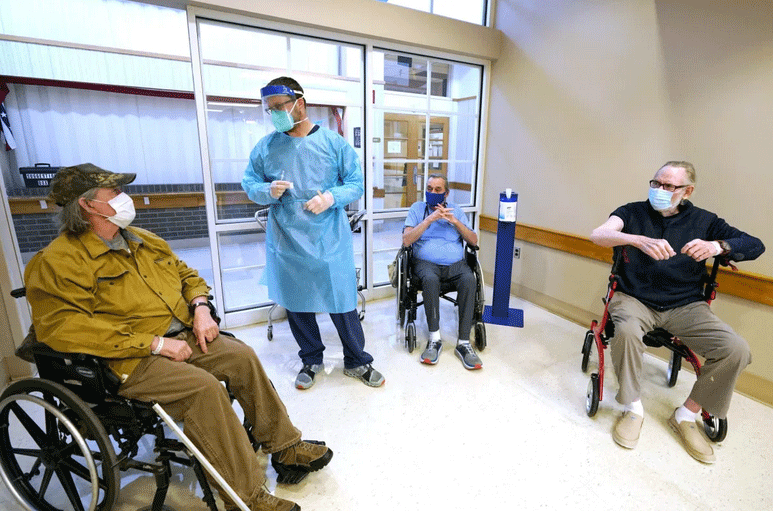WCH In the News
Commentary: Urgently Needed – A Racial Equity Approach to Covid-19 Vaccine Distribution
Original article courtesy of Daily Yonder.
by James H. Johnson, Jr., Jeanne Milliken Bonds and Allan M. Parnell .
Updated 1:13 AM ET, Fri. January 22, 2021


Brent Myers, a CVS pharmacist, second from left, speaks with residents of the Mississippi State Veterans Home in Jackson, Mississippi, about their receiving the Pfizer covid vaccination. The coronavirus vaccines have been rolled out unevenly across the U.S., but some states in the Deep South have had particularly dismal inoculation rates made even worse by racial disparities in access to the vaccine. (AP Photo/Rogelio V. Solis, File).
Six states—Delaware, Maryland, Mississippi, North Carolina, Tennessee, and Virginia—report Covid-19 vaccination data by race. A recent analysis of the data revealed that “white people so far have gotten most of the Covid-19 shots” in all six states.
Notably, North Carolina reportedly has the widest race and ethnic disparity in vaccination administration. According to the state’s Covid-19 vaccine dashboard, North Carolina had vaccinated 109,799 individuals against the deadly virus as of January 8, 2021. Whites received 80% of the vaccinations while Blacks and other people of color received only 20%.
Using their respective shares of Covid-19 cases as benchmarks, Whites—62% of cases—were grossly over-represented while Blacks and other people of color—38% of cases—were grossly under-represented in vaccine coverage. North Carolina dashboard data that are more recent indicate that people of color have received only 10% of the vaccinations in our state.
This should not be surprising given our current race blind approach to phase one vaccine rollout. To date, in all fifty states, we have focused primarily on two crucial variables—age and occupation—to prioritize distribution. Strikingly, we are ignoring the critical impact of systemic racism in vulnerabilities to the deadly virus.
In the phase one rollout, essential health care workers and adults 75 or older (recently expanded to include those 65 or older) receive priority for vaccinations. This approach would make perfect sense if our society were equitable and just. Unfortunately, it is not, which is why there is an urgent need for a racial equity approach to vaccine rollout.
The demographic make-up of the U.S. senior population illustrates the nature of the problem with the current roll out strategy. In 2019, Whites made up 76% of the nation’s 65 and older population, exceeding their 60% share of the total population. Blacks were less than 10% of the nation’s senior population, lagging their 13% share of the total population.
Translation: there are nearly eight white older adults for every one black older adult in the U.S., resulting in a major advantage for Whites over Blacks in the current vaccine rollout plan. Unfortunately, this is the reality despite rigorous scientific evidence confirming that coronavirus vulnerabilities vary markedly by race within the U.S. older adult population.
Racial disparities exist in coronavirus infection, hospitalization, and death rates for older adults—and the population generally—because the impacts of the social determinants of health—the conditions under which we live, work, and play—vary by race. Due to a legacy of discrimination in all walks of life, we know, for example, the poverty rate for Black older adults is more than twice as high as the poverty rate for all older adults and three time as high as the poverty rate for White older adults.
Further, owing to persistently low wages during their prime working years, we know the Black elderly are more likely than their White counterparts to live in sick residential buildings—older deteriorating housing with legacy pollutants like mold, mildew, lead, and radon. They are also more likely to live in hyper-segregated neighborhoods—many proximate to noxious facilities that spew toxic hazards into the natural environment and adversely affect local residents’ immune systems and overall health.
In part, as a function of such dangerous living circumstances that often span the entire life course, Blacks are more likely to experience disability earlier, and therefore, have shorter years of active life expectancy than Whites. Often this state of affairs stems from comorbidities of multiple chronic diseases and early on-set of age-related challenges that constrain or limit a range of activities that impact daily living and the instrumental activities of daily living, including the ability to see, hear, remember, dress, and interact.
In addition, Black older adults are more likely than White older adults are to live in multigenerational households, often sharing accommodations with adult biological offspring, grandchildren, and other relatives. Such living arrangements, which also are commonplace among other people of color, heighten the risks of exposure and transmission of the deadly coronavirus.
Moving forward, race–specific aspects of disease vulnerabilities must drive the coronavirus vaccine distribution. A race-conscious plan must ensure both equitable opportunities of access and equitable opportunities of uptake of vaccines. Failure to quickly develop and implement such a plan will constitute yet another glaring example of systemic racism—an unacceptable outcome in our increasingly diverse society.
Johnson and Bonds are professors in the Kenan-Flagler Business School at UNC-Chapel Hill. Parnell is Vice President of the Mebane, NC-based Cedar Grove Institute for Sustainable Communities.
Other News
Mass Migration: Why are people moving south?
Mass Migration: Why are people moving south?Virginia’s demographics are changing. Jeanne Milliken Bonds, public policy professor at UNC Kenan-Flagler Business School explains the shifts. Home | Publications | Mass Migration: Why are people moving south?...
The EIDC Economic Development Journal – Fall 2023
WCH In the NewsThe EIDC Economic Development Journal - Fall 2023 International Economic Development Council1275 K Street, NW, Suite 300 • Washington, DC 20005 • www.iedconline.orgChair: Jonas Peterson, CEcDPresident & CEO: Nathan OhleEditor: Jenny Murphy.November...
The painful pandemic lessons Mandy Cohen carries to the CDC
The painful pandemic lessons Mandy Cohen carries to the CDC"North Carolina initially failed to prioritize testing for people who were exposed to #COVID19 because of where they live or work." - Jeanne Milliken Bonds, Professor of Social Impact Investing at the...



